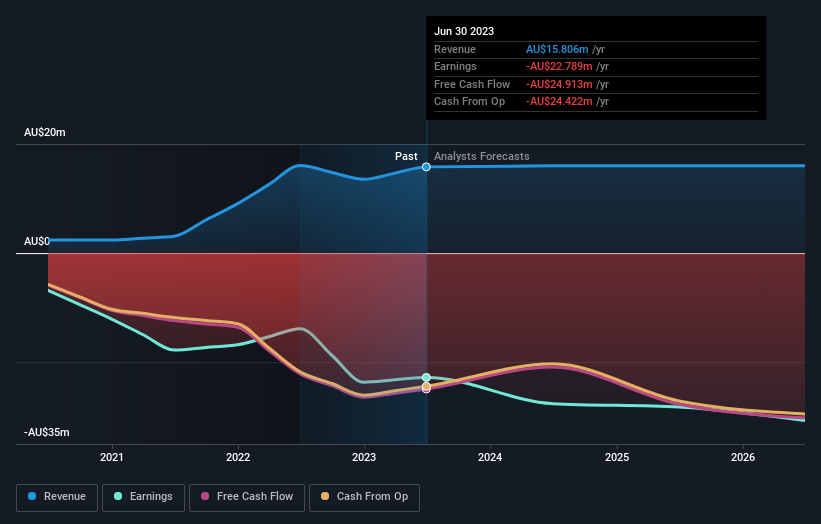Stock Analysis
Despite recent sales, PYC Therapeutics Limited (ASX:PYC) insiders still control 57% of the company

Key Insights
- Insiders appear to have a vested interest in PYC Therapeutics' growth, as seen by their sizeable ownership
- The top 2 shareholders own 50% of the company
- Insiders have sold recently
A look at the shareholders of PYC Therapeutics Limited (ASX:PYC) can tell us which group is most powerful. With 57% stake, individual insiders possess the maximum shares in the company. Put another way, the group faces the maximum upside potential (or downside risk).
Insiders own the top position in the company’s share registry despite recent sales and as a result, were the biggest beneficiaries of last week’s 14% gain.
Let's take a closer look to see what the different types of shareholders can tell us about PYC Therapeutics.
Check out our latest analysis for PYC Therapeutics

What Does The Institutional Ownership Tell Us About PYC Therapeutics?
Institutions typically measure themselves against a benchmark when reporting to their own investors, so they often become more enthusiastic about a stock once it's included in a major index. We would expect most companies to have some institutions on the register, especially if they are growing.
Less than 5% of PYC Therapeutics is held by institutional investors. This suggests that some funds have the company in their sights, but many have not yet bought shares in it. So if the company itself can improve over time, we may well see more institutional buyers in the future. We sometimes see a rising share price when a few big institutions want to buy a certain stock at the same time. The history of earnings and revenue, which you can see below, could be helpful in considering if more institutional investors will want the stock. Of course, there are plenty of other factors to consider, too.

Hedge funds don't have many shares in PYC Therapeutics. The company's largest shareholder is Alan Tribe, with ownership of 46%. For context, the second largest shareholder holds about 4.6% of the shares outstanding, followed by an ownership of 4.5% by the third-largest shareholder.
To make our study more interesting, we found that the top 2 shareholders have a majority ownership in the company, meaning that they are powerful enough to influence the decisions of the company.
Researching institutional ownership is a good way to gauge and filter a stock's expected performance. The same can be achieved by studying analyst sentiments. While there is some analyst coverage, the company is probably not widely covered. So it could gain more attention, down the track.
Insider Ownership Of PYC Therapeutics
The definition of an insider can differ slightly between different countries, but members of the board of directors always count. The company management answer to the board and the latter should represent the interests of shareholders. Notably, sometimes top-level managers are on the board themselves.
Most consider insider ownership a positive because it can indicate the board is well aligned with other shareholders. However, on some occasions too much power is concentrated within this group.
It seems that insiders own more than half the PYC Therapeutics Limited stock. This gives them a lot of power. Given it has a market cap of AU$325m, that means they have AU$185m worth of shares. Most would be pleased to see the board is investing alongside them. You may wish todiscover (for free) if they have been buying or selling.
General Public Ownership
The general public-- including retail investors -- own 28% stake in the company, and hence can't easily be ignored. This size of ownership, while considerable, may not be enough to change company policy if the decision is not in sync with other large shareholders.
Private Company Ownership
We can see that Private Companies own 14%, of the shares on issue. It's hard to draw any conclusions from this fact alone, so its worth looking into who owns those private companies. Sometimes insiders or other related parties have an interest in shares in a public company through a separate private company.
Next Steps:
It's always worth thinking about the different groups who own shares in a company. But to understand PYC Therapeutics better, we need to consider many other factors. Like risks, for instance. Every company has them, and we've spotted 5 warning signs for PYC Therapeutics (of which 2 shouldn't be ignored!) you should know about.
If you would prefer discover what analysts are predicting in terms of future growth, do not miss this free report on analyst forecasts.
NB: Figures in this article are calculated using data from the last twelve months, which refer to the 12-month period ending on the last date of the month the financial statement is dated. This may not be consistent with full year annual report figures.
Valuation is complex, but we're helping make it simple.
Find out whether PYC Therapeutics is potentially over or undervalued by checking out our comprehensive analysis, which includes fair value estimates, risks and warnings, dividends, insider transactions and financial health.
View the Free AnalysisHave feedback on this article? Concerned about the content? Get in touch with us directly. Alternatively, email editorial-team (at) simplywallst.com.
This article by Simply Wall St is general in nature. We provide commentary based on historical data and analyst forecasts only using an unbiased methodology and our articles are not intended to be financial advice. It does not constitute a recommendation to buy or sell any stock, and does not take account of your objectives, or your financial situation. We aim to bring you long-term focused analysis driven by fundamental data. Note that our analysis may not factor in the latest price-sensitive company announcements or qualitative material. Simply Wall St has no position in any stocks mentioned.
About ASX:PYC
PYC Therapeutics
A drug-development company, engages in the discovery and development of drug solutions in the areas of RNA therapeutics in Australia.
Flawless balance sheet with limited growth.


